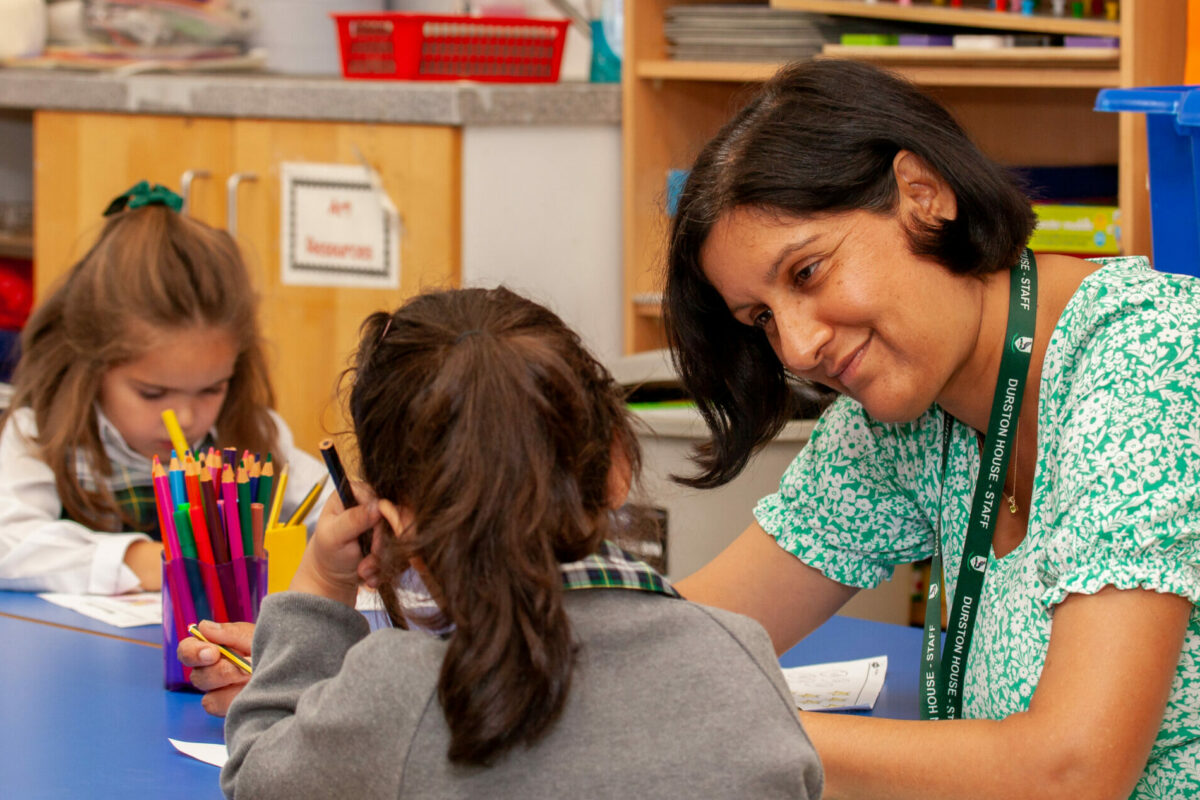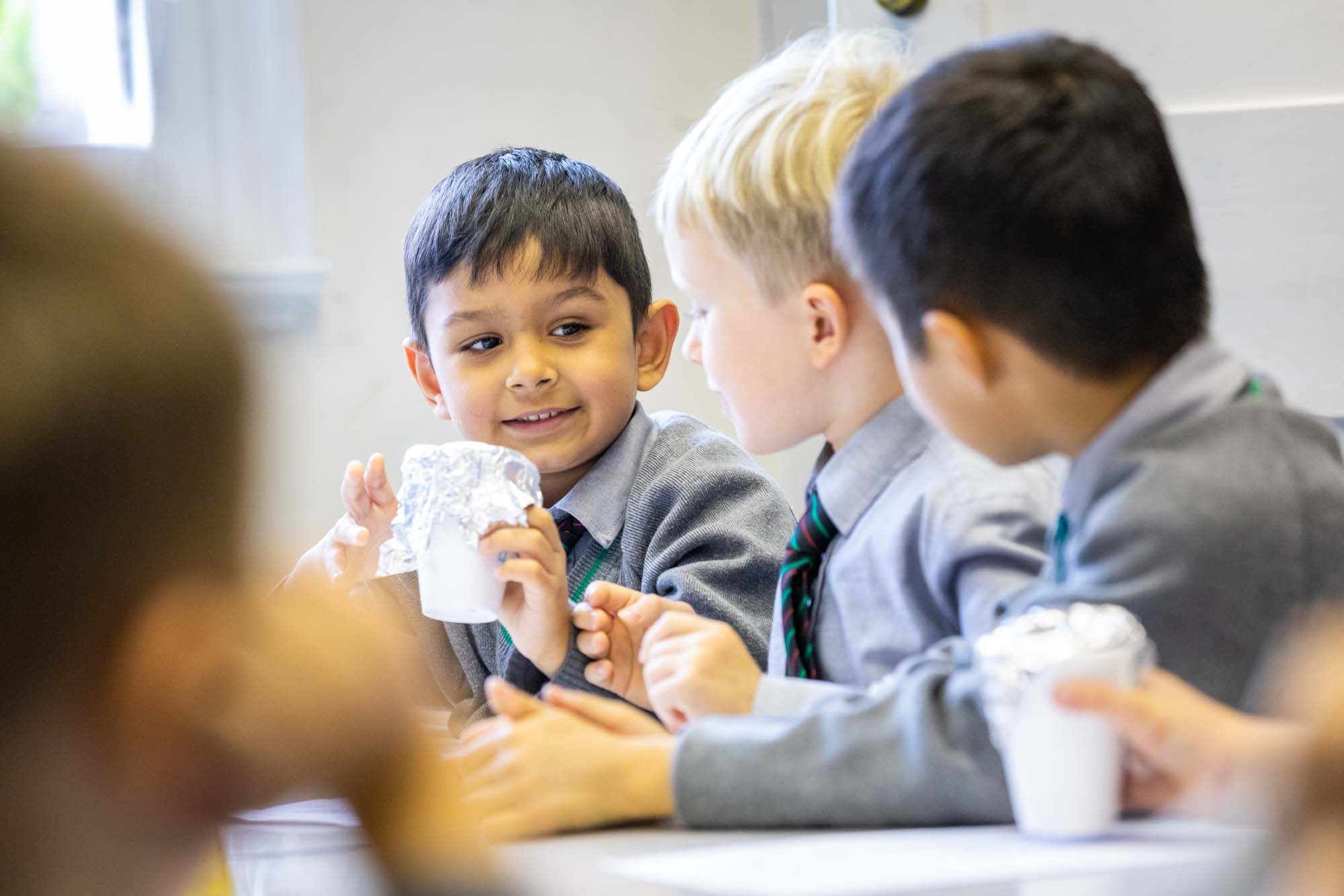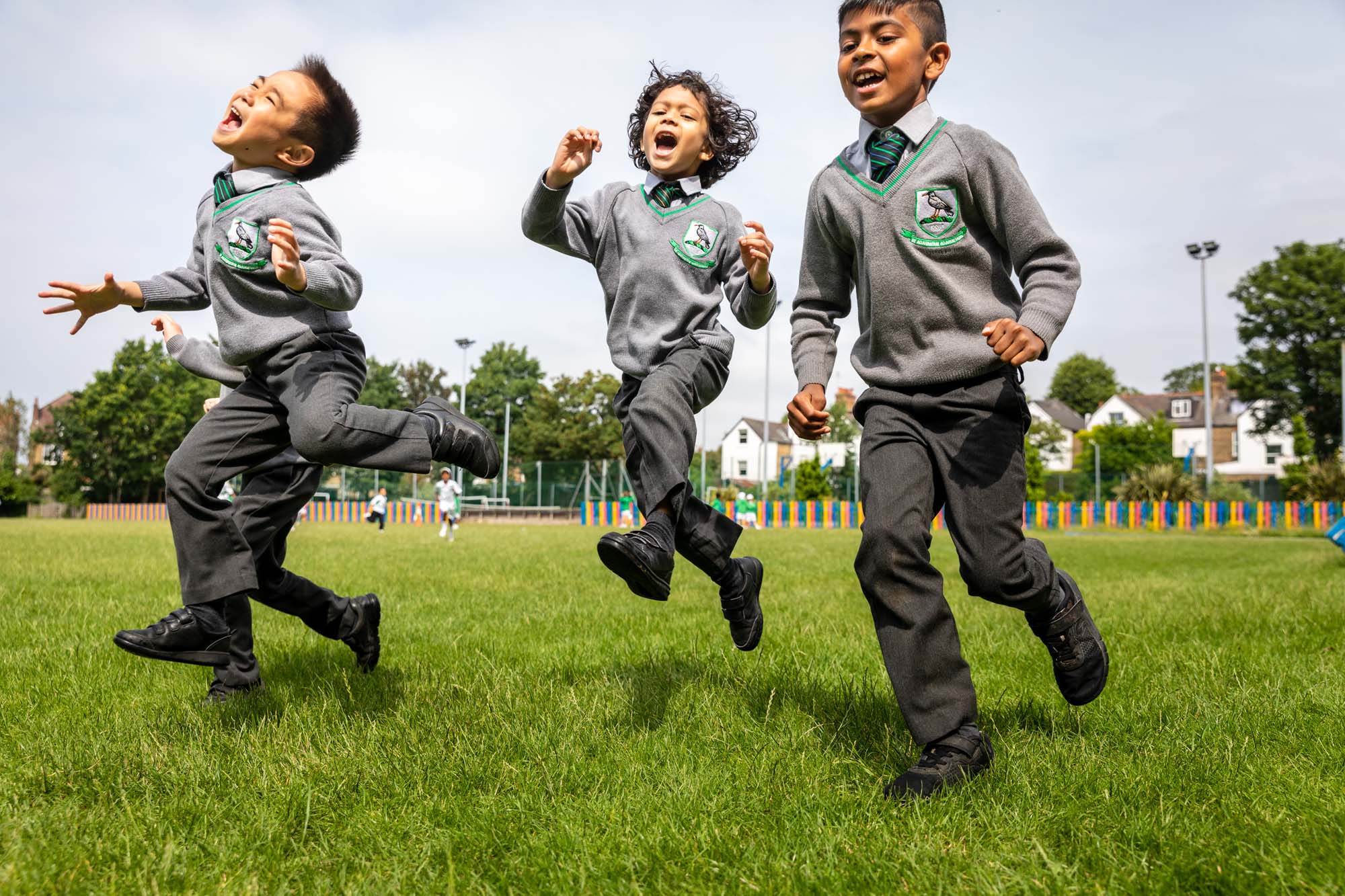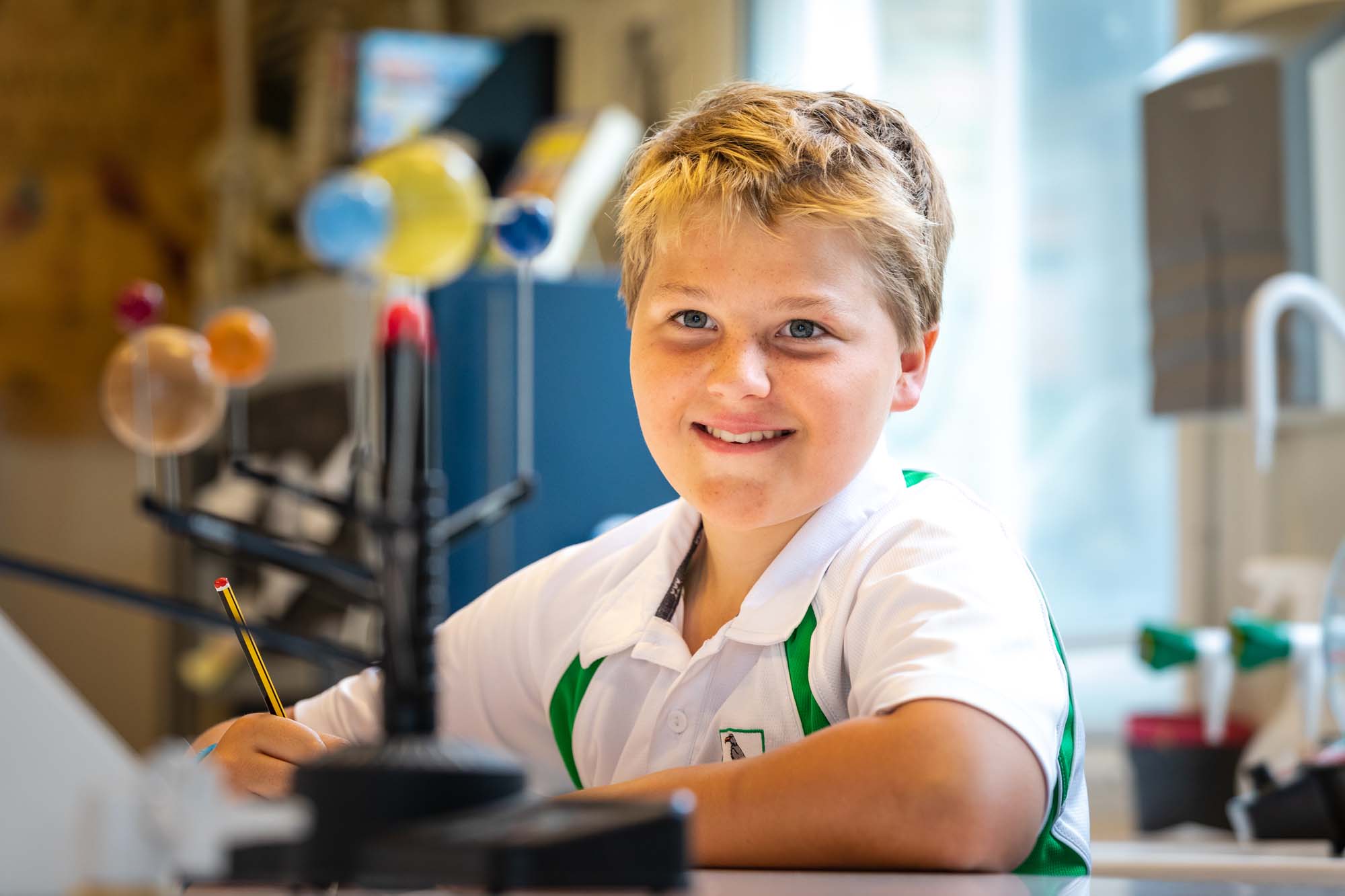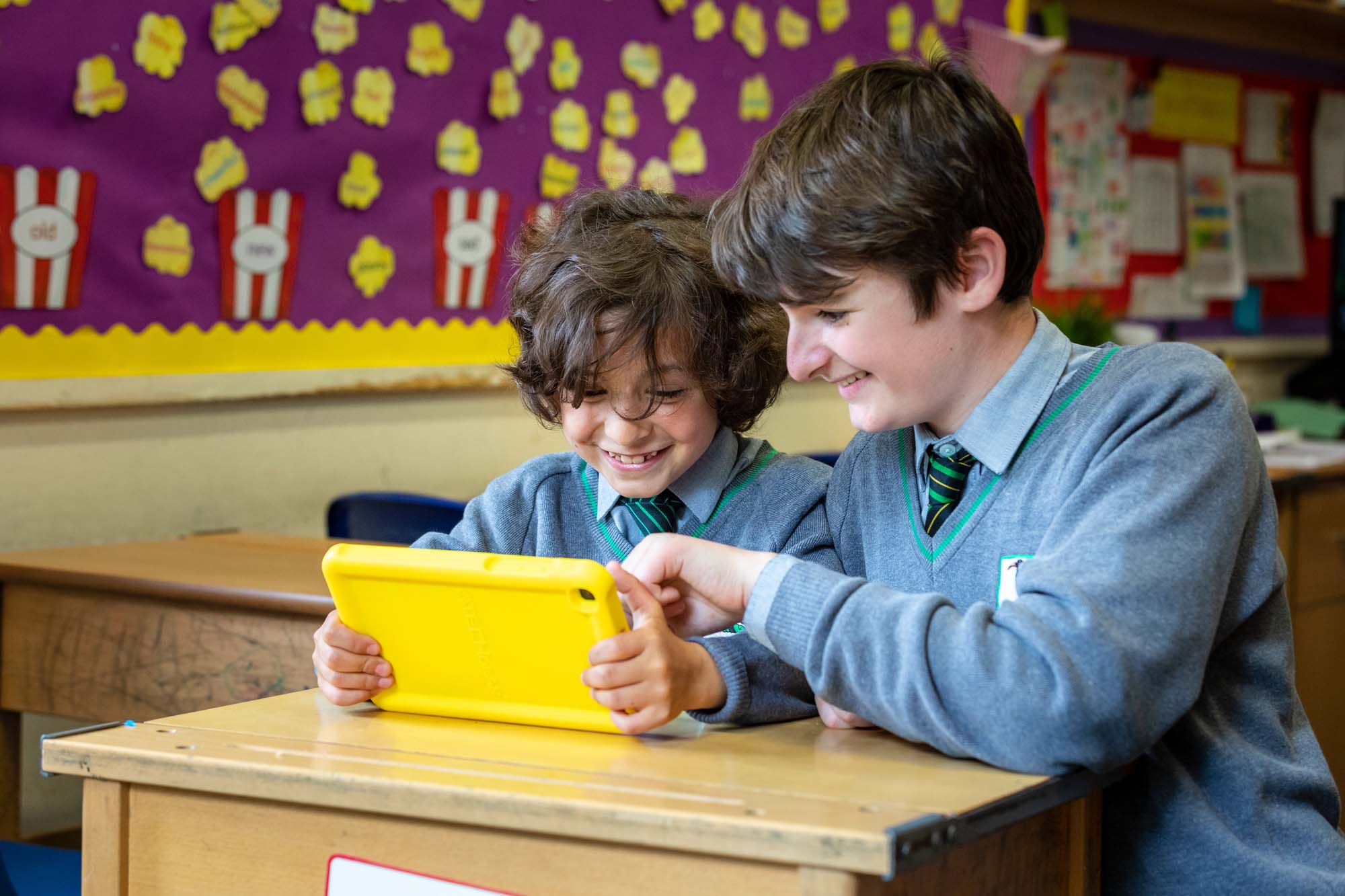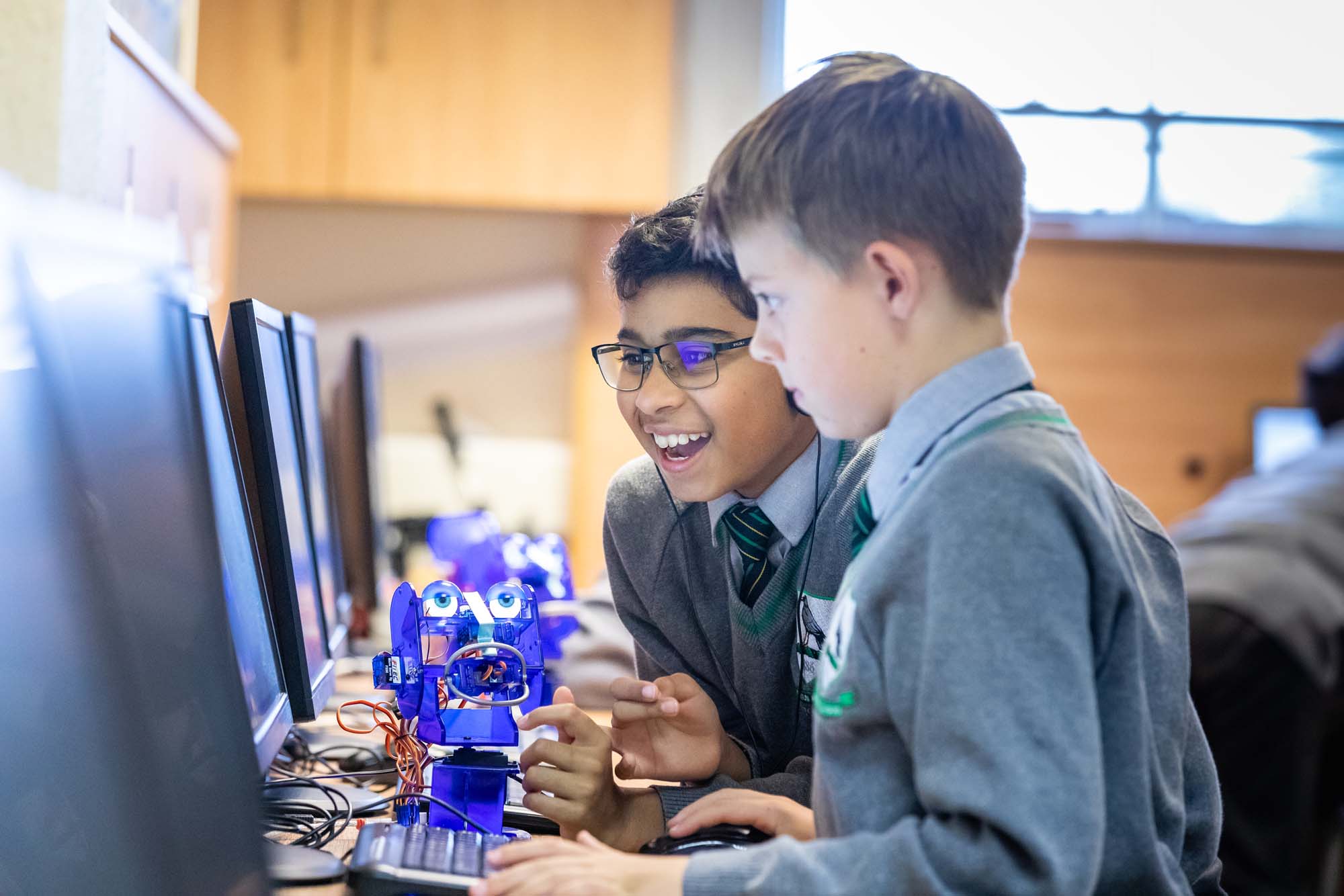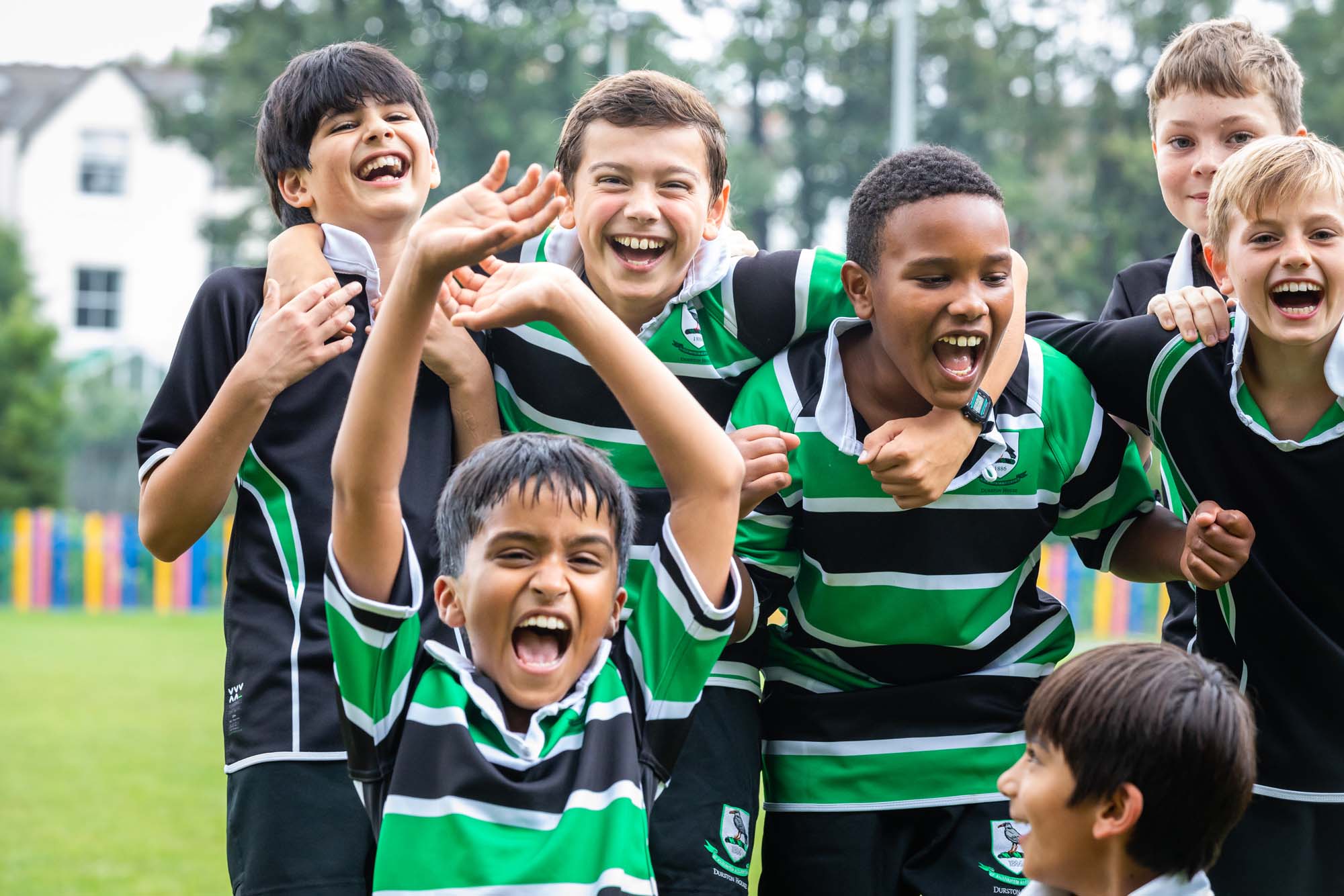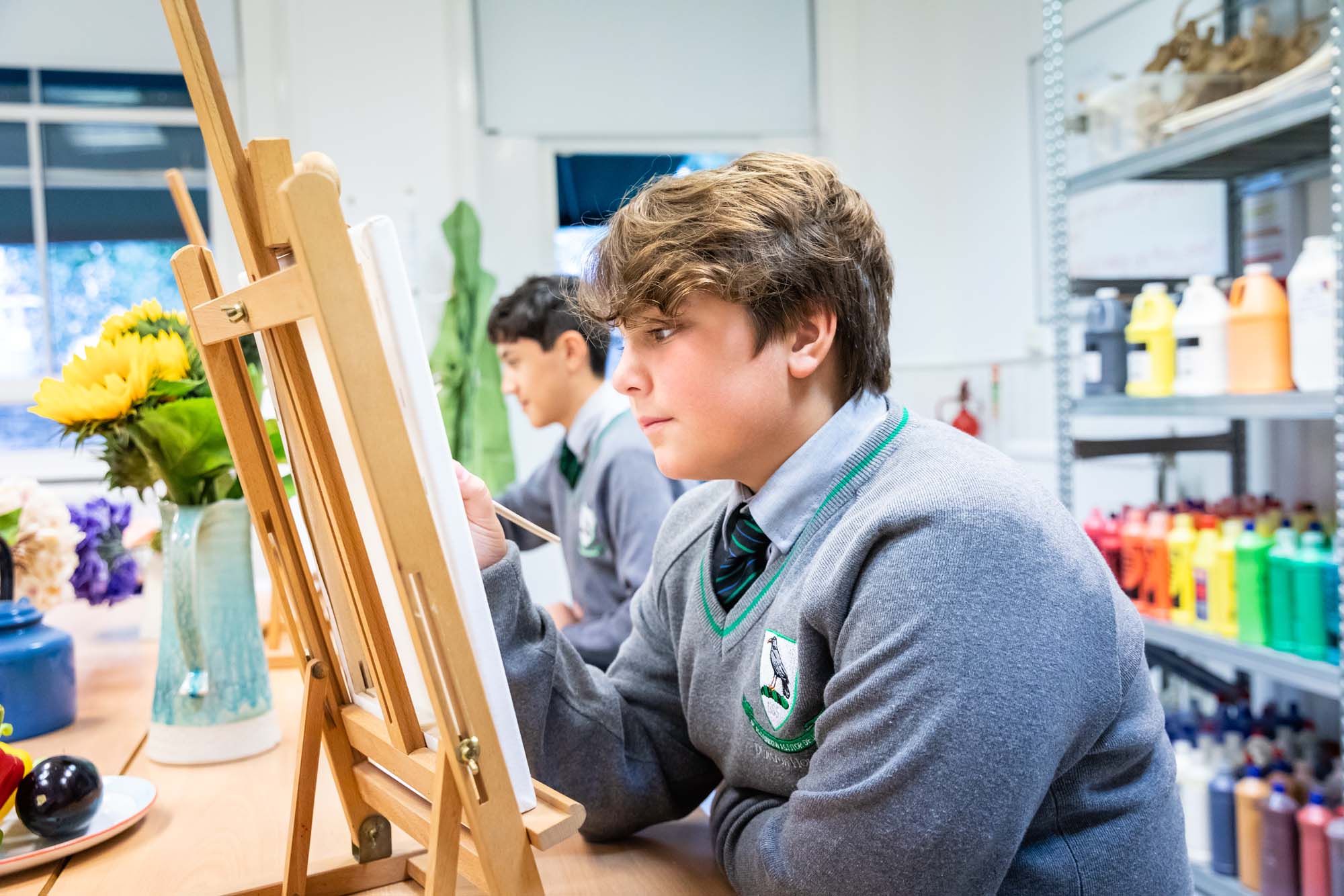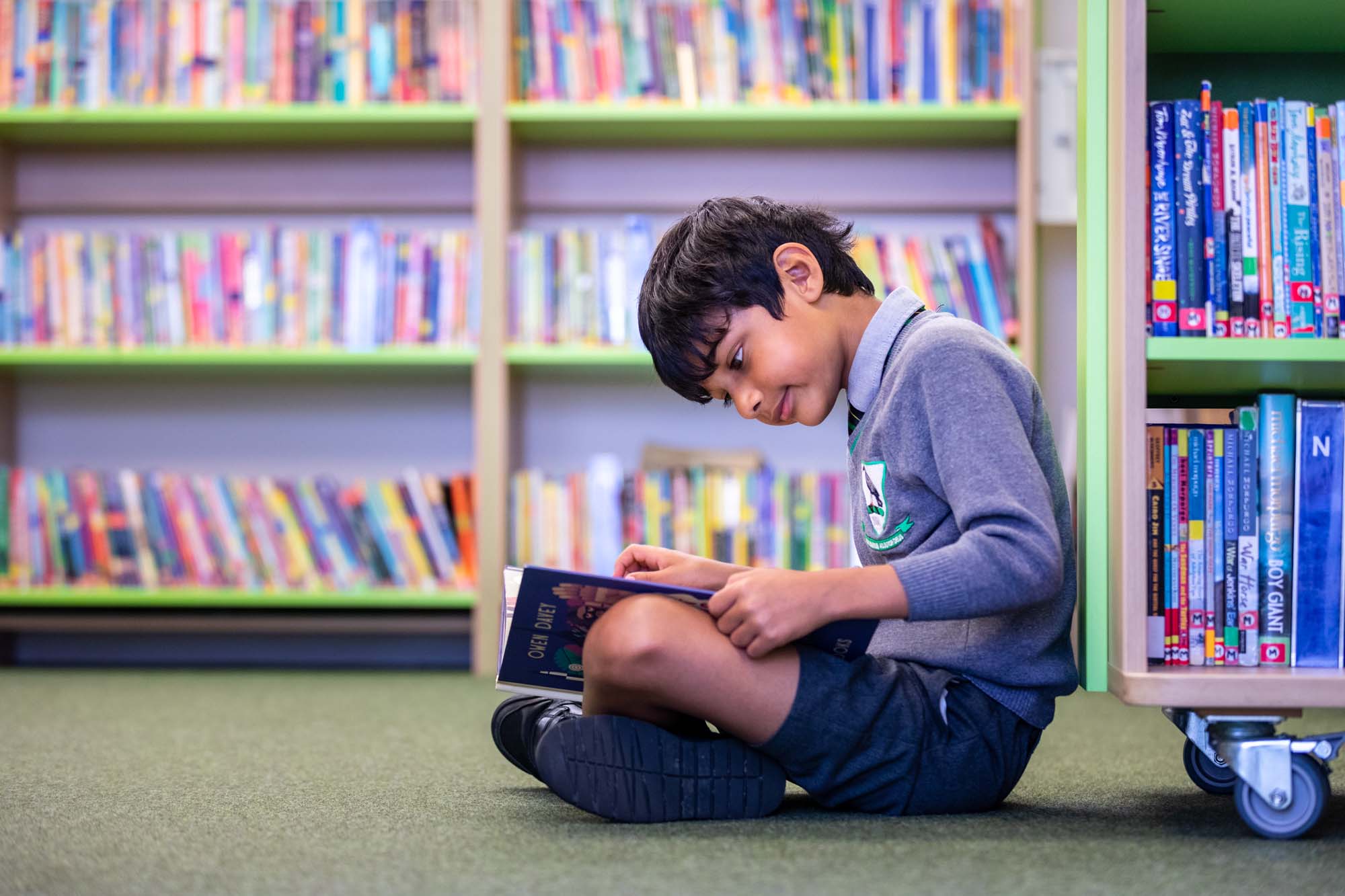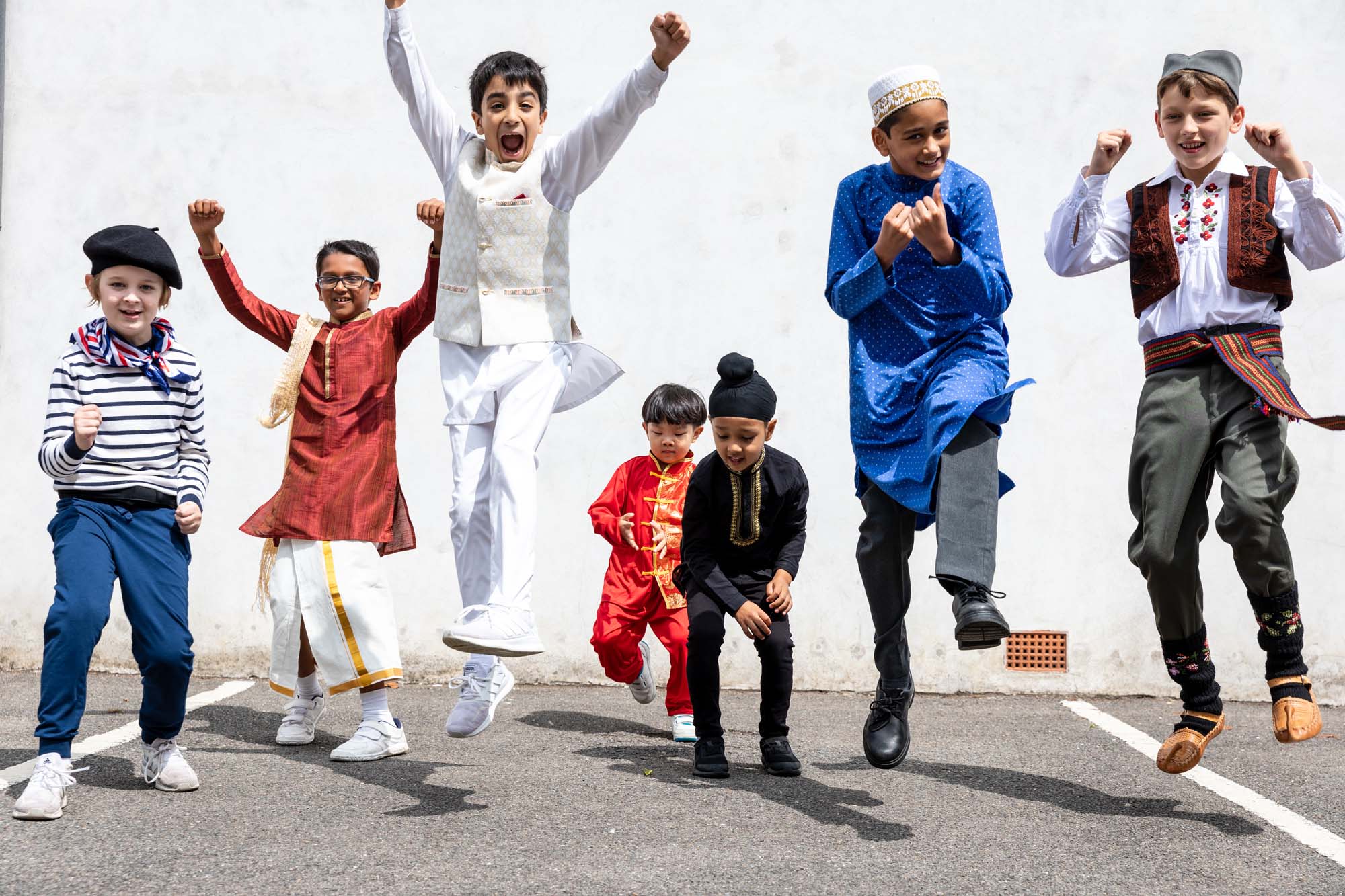The Curriculum
Academic

Art
While Art projects in Pre-Prep often focus on experimentation and an exploration of art techniques, they may also share links with other subjects, allowing a further understanding of those areas through a creative medium. For example, the study of Science helps pupils to understand facial and body proportions; shape and symmetry in Mathematics inform their work with Kandinsky and symmetrical patternmaking; a knowledge of the Aztecs inspires the making of traditional Mexican artwork; and Aboriginal dot painting has been introduced to enhance the pupils’ learning about Australia. So, too, participation in school workshops and outings to local museums and galleries help expand the pupils’ knowledge and appreciation of art.

English
All pupils are encouraged to develop the habit of regular reading through graded reading books and weekly library-based English lessons. Comprehension skills of both fiction and non-fiction texts are developed and pupils are increasingly encouraged to talk about what they read. We practise a variety of story writing genres and other forms of writing, such as instructions and recounts. Pupils compose their own poems, looking carefully at how to craft images using adventurous vocabulary and descriptive language. They are encouraged to write more technically and express their ideas fluently whilst adopting the use of a range of punctuation. The basics of English Grammar are taught weekly. Speaking and Listening skills are developed across the curriculum and Drama is integrated in lessons with teachers incorporating role play, performance and other techniques to enhance the educational experience.

Games
Each year group in Pre-Prep has one Games session per week, lasting 60-80 minutes, at Castlebar playing field. During these sessions, pupils have opportunities to learn about movement, beginning to understand, appreciate, and move their bodies whilst relating positively to others. This learning takes place as they engage in play, gymnastics, games, sport, and other exercise. Pupils begin to learn the skills required for the sports that they will participate in as they move through the school – football, rugby, hockey, tennis, netball and cricket.

Humanities
Throughout their time in Pre-Prep, children take a trip around the world discovering what life is like in countries far and wide. Everywhere, from our local area to the Rainforests of South America, is studied so that a knowledge of the world in which we live is developed and nurtured from a young age. Pupils also step back in time to see what life was like in the past. They look at a variety of topics including life in a Medieval Castle, The Great Fire of London, the Aztecs and the oldest civilisation in the world: Australian Aboriginals. Topics are brought to life by Outings or Workshops to complement what has been learnt in the classroom.

Computer Science
In Year 1, pupils begin to understand the need for ICT and how to access it, and they are taught the differences between natural and artificial systems. They are encouraged to learn basic ICT functions, including how to log in and find their way around a desktop/touchscreen environment. From this young age, a form of programming is introduced: giving digital instructions to Bee Bots enables them to see those instructions played out physically. The software Purple Mash gives the opportunity to learn how to present specific information through the use of ICT.
In Year 2, the pupils begin to use Microsoft Office packages in order to manipulate and present data. The safe and respectful use of technology is deepened, and children are taught how and where to get help and support when concerns arise.

Mathematics
Pupils study a number of strands within Mathematics, following a mastery curriculum. The Number strand makes up approximately half of the curriculum and ensures that pupils develop competence with whole numbers, learning to count, use place value, add, subtract, multiply and divide. Mental skills are developed to increase fluency in all areas. Measurement and Geometry are also taught, with due emphasis on using manipulatives and other concrete apparatus whenever appropriate. This enables pupils to experience tangibly the manipulations that take place before moving on to abstract representations. The subject is also enlivened through practical work outside the classroom. We aim to give pupils a deep sense of the application of Mathematics in the real world.

Music
Children in Pre-Prep have two music lessons per week. They are introduced to core musical elements: pulse, rhythm, pitch, timbre, tempo, and dynamics. The Kodály and Solfège methods promote the use of voice as the first instrument. Developing the confidence to sing solo in front of an audience is encouraged from the earliest age. Furthermore, pupils have a weekly lesson in Music and Movement, which provides them with the opportunity to link together the visual, auditory and kinaesthetic elements of music. All children are involved in the Pre-Prep Christmas production.

PE
Pupils in Reception-Year 2 are encouraged to engage in movement experiences that promote and support the development of physical and social skills. Throughout the Autumn Term pupils work on their general ball skills whilst playing football. During the Spring Term, pupils participate in gymnastics-based activities, which focus on spatial awareness and fundamental movement skills. In the Summer Term, pupils develop their striking skills playing tennis, and running, jumping and hopping are the focus of an introduction to Athletics.

PSHME
In Pre-Prep, pupils will focus on 3 main themes: Health and Well-being of yourself and others, Relationships, and Living in the Wider World. Within each theme pupils explore topics such as Self-esteem, Kindness and Confidence, Friendships and Playing Together, Bullying, and learning How to be Part of a Team. They learn about Personal Hygiene, Cyber and Road Safety, How to Make Sensible Choices, Basic Democracy and Fairness, Stranger Danger and What to do in an Emergency. Additionally, pupils are prepared for their move to Junior School. The curriculum is designed to be flexible and adapt to the needs of individual pupil, classes and cohorts. It aims to enrich and engage them by drawing upon personal experiences of the world around with the intent to scaffold their learning. PSHME is a dynamic and fluid subject area where we respond and listen to what is happening in pupils’ lives and prepare them to question, celebrate, understand and be an active participant within the ever-changing world around them.

Science
In Pre-Prep, the teaching and learning of Science focuses on providing opportunities for pupils to experience and explore the world around them. Pupils cover a plethora of topics in the three areas of Science, Biology, Chemistry and Physics, which are developed in greater depth in the following years. Lessons include practical in-class activities, multimedia resources and use of the woodland area at Castlebar Field. Pupils use simple measuring methods and equipment to investigate topics of enquiry by enabling them to predict, hypothesise, investigate, record data and conclude theories. Pupils are encouraged to work collaboratively, to communicate effectively and to use scientific vocabulary to support their reasoning. To enhance their learning experience and understanding, outings to Kew Gardens and Bird World allows pupils to explore their knowledge and curiosity of the wider world.

Theology, Philosophy and Religion (TPR)
Children in Pre-Prep start to build their knowledge about the different religions. They may explore a theme and discover how it is represented in the main faiths, such as the different places of worship, rites of passage or festivals. A range of stories pertinent to the faiths are told, such as those from the Old Testament or that of the Guru Nanak. Pupils in Years 1 and 2 also participate in a Diwali storytelling workshop.
Where possible, parents of different faiths are invited into the classes to enlighten children about the different religious traditions. Pupils also visit our local church, Haven Green, as an example of a place of worship.

Art
Art in Junior School continues to share strong cross-curricular links, particularly with the Humanities and the study of Ancient Egypt and Greece. However, there is now an increased focus on technical skills as the pupils investigate colour application, incorporating different types of mark-making for outline, shading and toning, as well as computer-based work and modelling techniques involving a variety of media. In Year 4, Art is taught by a specialist Art teacher. Alongside Visual Arts, pupils will learn about Art History and about contemporary artists, to help develop greater appreciation for diversity, create connections between past and present, and enhance critical thinking. A selection of exciting topics will include Amadeo Modigliani’s surrealist elongated portraits; Jackson Pollock’s Abstract Expressionism; clay Tudor Roses and papier-mache sculptures inspired by Art Nouveau.

French
In Year 3, the pupils experience a mostly relaxed and occasionally lively introduction to French. There is an increasing use of the Target Language, with songs and visuals, and authentic teaching resources in the classroom. The pupils are exposed to a balance of each of the four skills: Listening, Speaking, Reading and Writing. These skills are taught in the context of the Common Entrance topics, including family, home, daily routine and free time as well as key vocabulary, sounds and grammar.

Games
Years 3-4 each have one Games session per week, which takes place at Swyncombe Playing Field. Throughout the year, pupils participate and compete in a range of team sports, the main sports being football, netball and cricket. A number of sessions also focus on cross-country training and athletics, prior to our school competitions. Pupils also start playing competitive fixtures against other schools.

English
English lessons in the Junior School are based on improving the oracy, writing and reading skills of all pupils. This is achieved via individual, partner, group and whole class activities, which consider the differing talents and abilities of the cohort. Pupils develop technical and analytical skills through weekly Spelling and Grammar lessons, alongside the analysis of text, film and images. These resources are used in both Comprehension and Writing tasks, including poetry and narrative. Elsewhere in the curriculum, pupils enhance their oracy prowess through poetry recital, including a whole school competition, as well as in lessons focusing on public speaking and debating. This ensures all pupils gain confidence in expressing themselves verbally, as well as learning to articulate their ideas in a logical manner. All pupils take part in the annual Junior School Production, enabling them to apply many aspects of their classwork in a joyful, challenging and collaborative environment. Particular emphasis is placed on reading, notably with the Accelerated Reader programme, which pupils find both challenging and rewarding.
Finally, outings and workshops take place in both year groups, which further aid certain aspects of in class teaching and learning.

Humanities
Humanities draws on both History and Geography. In Year 3, the topics have the thread of History and Geography interwoven, so that whilst studying Ancient Egypt in the Autumn Term, pupils learn about its location and climate, in tandem with the construction of pyramids, Egyptian Gods and hieroglyphs. In the Spring Term, Year 3 pupils study the major events and myths of the Ancient Greeks as well as looking at the geography of the islands and how this helped shape their civilisation. The Summer Term places a greater emphasis on Geography with the study of oceans, with the pupils working on a cross-curricular Ocean Creatures project. In Year 4, pupils look at History first, starting with the British Timeline; from the Stone Age to the Battle of Hastings, followed by an in-depth study of Roman Britain and the Roman legacy. Pupils continue with the British History theme in the Spring Term, learning about the Anglo-Saxons and how they left their mark on the country. There is a geographical emphasis in the Summer Term, looking at The British Isles, World Continents and Oceans as well as Rivers. To extend the topic of Rivers in Year 4, pupils visit a river for field work, where data is collected and analysed, forming the basis of a project. To support classroom learning in Junior School, Outings to the British Museum and Verulamium take place. Workshops are also used to engage and excite the pupils, adding practicality and understanding to what they have learned.

Computer Science
In Year 3, pupils are introduced to digital literacy including best practices for handling computer equipment, logging in and out of services, utilising web interfaces, and how to stay safe online and while using technology. With the Microsoft Office suite, they will learn how to create presentations and edit text for use across other subjects. They will also be introduced to block-based programming with Scratch.
In Year 4, scenario-based projects are completed through an ever-growing programming skillset using Scratch. Inspired by the historical figures of computer science and infused with lessons on computer use and misuse, they will begin to understand what it means to be a digital citizen.

Mathematics
In Junior School, pupils continue to use concrete materials, manipulatives, and visual representations in order to build their confidence and develop a solid foundation for their mathematical understanding. There is also a growing emphasis on developing more abstract concepts and ideas, with a particular focus on formal written methods and the terminology used to describe the properties of number and shape.
Pupils begin each school year with a general focus on place value and the four operations, including mental and written methods. They are then able to apply these skills to problem solving, working with units of measure, telling the time and dealing with money.
Additionally, pupils generate, represent and interpret data and become familiar with the properties of 2-D. Throughout the year, there are opportunities to practise mathematical skills in a variety of contexts, including completing exercises from textbooks and worksheets, experimenting with hands-on activities, using the laptops for online lessons, solving relevant day-to-day problems, and performing mathematical operations.

Music
In Junior School, pupils have two weekly lessons, during which they develop their understanding of the basic principles of written music notation and music theory. Pupils continue to develop their singing and musicianship skills. They sing songs and play instruments with increasing confidence, skill and expression and contribute to a group or class performance. An understanding of improvisation and musical composition is developed through independent and creative responses to stimuli. A wide variety of instruments is introduced and pupils become more confident in recognising these in musical extracts. All pupils take part in the Junior School production which is performed in the Spring Term.

PE
In Junior School, the main focus is on developing co-ordination and motor skills and increasing knowledge about movement. Pupils in Years 3-4 develop small ball skills with a focus on throwing and catching in the Autumn Term, furthering their understanding of the flight and bounce of different sized balls. They are also introduced to the additional skills required to play Rugby at that age. During the Spring Term pupils continue to improve their small ball striking skills through playing Hockey and Tennis. The main activity in the Summer Term is Athletics, with emphasis on running, jumping, and throwing in preparation for our Annual Sports Day.

PSHME
In Junior School, the topics studied relate to Relationship Education, Health Education and Living in the wider world. To prepare pupils in Years 3-4 for the move to Middle School, they will need knowledge that will enable them to make informed decisions about their wellbeing, health and relationships and to build self-efficacy. PSHME also supports young people to develop resilience so that the boys are better able to cope with challenges. Pupils are exposed to topics such as Emotional wellbeing, Economic wellbeing, aspects relating to their physical health, relationships and growing and changing. Anti-bullying activities form part of the annual Anti-bullying week, while online safety and the safeguarding of the boys is of paramount importance. The Junior School pupils will also be exposed to the responsibilities they have for the local environment, how to manage sustainability and safety in different environments.

Science
In Years 3-4, pupils broaden their scientific view of the world around them. They develop and test ideas about everyday phenomena and develop a deeper understanding of the relationships between living things and their environments. They learn to ask their own questions about what they observe and make decisions about which types of scientific enquiry are best suited to answering their questions.
Overall, pupils are encouraged to work individually and collaboratively to carry out investigations and to develop a body of knowledge on which to base future scientific learning. Emphasis is placed on the importance of scientific enquiry in the outside world and its impact on our lives, both now and in the future. Pupils will develop a deeper understanding of habitats, plant growth and learn the importance of nutrition, digestion and the skeleton.
A Year 3 Outing to London Zoo and a Year 4 Outing to the London Wetlands are used to enhance these parts of the curriculum. Additionally, rocks and fossils, the characteristics of light, forces, sound and electricity are discussed in depth. Pupils continue to develop a deeper understanding of materials and how they change through their respective properties.

TPR
In Junior School, in each year, pupils explore two of the six major faiths: Christianity and Sikhism in Year 3, Judaism and Hinduism in Year 4. The focus is to enable them to understand their own and their society’s heritage. As part of a multi-cultural school, pupils are encouraged to draw and reflect upon their own experience of religion and contemporary issues, and to identify and respond to ethical problems of everyday life.
Visits to St Peter’s Church, Ealing Synagogue, Neasden Temple and Sri Guru Singh Sabha Gurdwara provide the boys with opportunities to experience the religion within the community and to reinforce the learning undertaken in the classroom.

Art
Middle School
The art curriculum in the Middle school explores a broad range of art movements and incorporates a variety of media. Both year groups will begin with still life studies. Pupils will build on their prior knowledge of composition, scale, colour theory, texture and perspective. The curriculum then shifts to Surrealism. In year 5, pupils will create sculptures influenced by Salvador Dali’s vast portfolio of multi-media work. In Year 6, pupils will focus on Frida Kahlo’s deeply reflective self-portraits and exciting use of colour. Clay work will take on different forms in the Middle School with Year 5 creating functional pottery and year 6 sculpting pieces influenced by the Pop Art movement. Pupils will go on to study Pointalism in Year 5 and Impressionism in Year 6.
Upper School
Across the Upper School, pupils will be developing their technical drawing skills by practicing blind contour drawing and timed exercises to improve speed, coordination and perspective. In Year 7, pupils will investigate David Hockney’s exuberant landscapes and further develop their ability to portray depth (foreground, midground, background, horizon line, vanishing point, scale) and take risks with colour application. Later, they will create mixed media sculptures inspired by abstract geometric artist, Piet Mondrian. Their study of abstraction will carry on to creating cubist self-portraits whilst learning about the creative minds of George Braque and Pablo Picasso. In Year 8, pupils will begin the year with an extensive portraiture study inspired by Picasso’s Blue Period. They will be challenged to create a large-scale self-portrait utilising a broad acrylic pallet in shades and tones of blue. Throughout this project they will hone their skills in accuracy, proportion and scale. The study of form and scale will continue with constructing mixed-media 3D animal sculptures. Later they will investigate clay and print-making.

English
Middle School
Pupils are encouraged to develop the habit of reading through their participation in the Accelerated Reader programme and their weekly library-based English lesson, leading to a lasting enjoyment and appreciation of literature. Pupils’ skills in the comprehension of both fiction and non-fiction texts are developed and they are increasingly encouraged to question and criticise what they read. Writing in different genres for a variety of purposes and audiences is practised. There is strong emphasis on accuracy of written expression, and skills in punctuation and spelling are reviewed and developed. Grammar work develops the pupils’ understanding of the English language, which enables them to express themselves more effectively. Pupils study novels and stories by significant authors such as Berlie Doherty, Ian Serraillier and Robert Louis Stevenson. Pupils compose their own poems, looking carefully at how to craft images, using similes and metaphors.
Upper School
In Years 7-8 pupils read fluently, avidly and with good comprehension. They develop the habit of reading from a broad range of material for both enjoyment and the acquisition of knowledge. Good reading habits enable the boys to write clearly, with precision of meaning, adapting linguistic conventions for a range of genres, purposes and audiences. Discussion of literature is encouraged so that the pupils can write with empathy and understanding about its universal themes. All pupils study classic literary works from a range of writers, poets and playwrights, including Shakespeare. They become competent at analysing the form as well as the content of such literature, and in doing so, come to articulate a personal response to their reading. Such valuable reading experiences facilitate mature written compositions and the pupils become skilled essay writers across a range of text types.

Geography
Middle School
Through the course of Year 5, the pupils develop their Ordnance Survey map skills and learn about Mountains, Settlement and Volcanoes. Linked to the Settlement unit, boys carry out measurements of traffic and pedestrian flows along a section of Ealing Broadway, through which they gain experience of the geographical fieldwork process at first hand. In Year 6, pupils first learn to locate the UK’s major geographical features. They then begin to study the Common Entrance themes starting with Weather and Climate. Related to this, the pupils undertake an independent fieldwork investigation into how and why contrasting habitats have different microclimates. The final topic taught in Year 6 is Coasts.
Upper School
In Year 7 pupils continue with the Common Entrance themes, Population and Settlement and Sustainability and Stewardship. At the end of Year 7 the pupils’ fieldwork skills are greatly enhanced through a residential Geography Trip to Snowdonia or Castlehead lasting 5 days, during which all pupils collect data for their geographical investigation, a requirement for Common Entrance. Year 8 begins with time devoted to completing this investigation, followed by the topics of Earthquakes and Volcanoes and Transport and Industry, which is taught from the Spring Term.
Through the course of these two final years there is a renewed focus on learning Ordnance Survey map skills and Global Location. There is also greater emphasis on teaching boys to apply their geographical knowledge and understanding correctly to exam-style questions. In the period following entrance examinations to Senior Schools, the pupils begin to learn about the reasons for patterns of global economic inequalities – part of the Development topic, which is a pivotal unit in many KS4 specifications. Teaching methods include presentations, note taking, quizzes, verbal questioning and DVD clips.

Computer Science
Middle School
In Year 5, the pupils are challenged further in their programming skills: provided with a scenario, they will now be developing their own scripts using Scratch, putting computational thinking to full use. Linking E-Safety with technology using learned ICT skills, they will be creating a multi-media presentation on the topic. Web design leads them to think creatively.
In Year 6, they will oversee the complex functionalities of Microsoft Excel, creating models by using formulae, functions and formatting. Computational thinking is at the heart of the school year as they are required to solve real-life problems using ICT. Towards the end of the year, programming leaps forward from Scratch to Python, which they will further develop in Upper School.
Upper School
In Year 7, the pupils are introduced to Python, a text-based programming language. They will learn about algorithms and sequences. Furthermore, they will understand the precision required by studying the different types of errors they could encounter while coding. ICT skills are developed, through the use of the Microsoft Office suite.
In Year 8, the pupils will be writing their own games, troubleshooting errors along the way. Using variables and data types, they will write print () and input () functions to obtain responses from their users. As the students get ready for the next step on their academic path, independent learning is reinforced as the year progresses.

French
Middle School
The pupils’ skills in the language continue to be nurtured by fun-filled activities. There is an emphasis on comprehension of reading and listening material, along with grammar and accuracy of written and oral expression. New themes such as towns, regions, shopping, holiday activities and the weather extend the boys’ vocabulary and understanding of the French Language. They are formally introduced to verb conjugations and begin to make purposeful use of the verbs avoir and être. Our residential Trip to Northern France in Year 6 is obviously a highlight of the French curriculum; pupils get first-hand experience of life in France, they speak and listen to French and immerse themselves in the French way of life.
Upper School
At this stage, the pupils are encouraged to develop further their pronunciation and intonation, and to use more complex structures to enhance meaning. They develop good dictionary and reference skills and learn to assess their own work and the work of others against success criteria. The pupils are exposed to more verb tenses and the grammar learnt during the first years is analysed in more detail and consolidated in a personalised learning environment. Small class sizes go a long way towards making this a realistic goal. Topics studied so far are revisited and range from school life to environmental issues. Lessons and prep are enriched by useful language-learning sites such as Linguascope, Languages Online and Quizlet. The pupils are well prepared for their respective future schools, armed not only with a good understanding of French but also the skills and enthusiasm to go ahead and learn other languages.

Games
Middle School
Middle School pupils have two Games sessions per week, which are held at either one of our playing fields. The Autumn Term sees the pupils participating in football training sessions and competing against other schools. Rugby training and fixtures take place in the Spring Term, whilst in the Summer Term, we concentrate on cricket and athletics. Focused training, matches and tournaments for those boys representing the school in the top teams take place over a number of weekends.
Upper School
The oldest pupils are involved in two Games sessions per week, which are held at either one of our playing fields, depending on the sport they have chosen and for which team they have been selected to play. The sports offered are similar to those in Middle School, with the addition of a choice of Hockey in the Spring Term and Athletics and Tennis in the Summer. Weekend training continues for those players selected for the top teams, and more weekend Tournaments are entered. Durston House also hosts annual Football and Rugby Tournaments at which many different schools come to compete.

History
Middle School
History, in Middle School, is taught in chronological order, covering the Medieval period, including the aspects of life the Black Death and subsequent Peasants’ Revolt, through to the religious and political changes under the Tudors, Henry VIII, Edward VI and Mary I. A visit to Hastings and Battle Abbey, and a residential Trip to York reinforce life in these times for pupils in Year 5, whilst a workshop, allowing boys to experience the lives of knights, noblemen and peasants is enjoyed in Year 6. In Year 5, enquiry skills and questioning historical evidence are the focus. In Year 6, more complex skills of selecting and evaluating historical sources are introduced, as are essays analysing them, all essential for Senior School entry in later years.
Upper School
In Year 7 the pupils make a smooth transition to the reign of Elizabeth I, investigating, amongst other things, the symbolism in her portraits, with an Outing to the National Portrait Gallery. Later, they move forward through time, to the early 17th century, discovering why the monarchy was so unpopular, leading to Civil War. Once in Year 8, we look at the madness of a ‘World Turned Upside Down’ before rejoicing in the restoration of the monarchy later in that century. Year 8 also focus on examination preparation for the Senior School of their choice. All pupils are encouraged to open their minds, to question historical documents and select evidence to justify their judgements, when interpreting a source. Essay writing is frequent, developing written analysis of anything from the Dissolution of the Monasteries to the Spanish Armada.

Latin
Middle School
In Year 6, after an introduction to the history of Indo-European languages pupils are introduced to the basic Latin grammar and vocabulary. Throughout the year they become aware that Latin is a highly inflected language in contrast with English, which is not. pupils start learning the first declensions and conjugations, simple paradigms and syntax and apply that knowledge in translation exercises. Since grammar shares how a language works, we consider that the grammar-translation method plays an essential role in learning a Classical language. With all Classical languages the topics that need to be learnt to achieve mastery fall under three categories. The most obvious one is vocabulary. Throughout the year pupils learn approximately 200 words in Latin. The second category is morphology, which deals with how some word classes like nouns, adjective, pronouns and verbs change their form in accordance with the role they play in a sentence. The third category of grammar is syntax, which teaches pupils how to choose the parts of the words whose morphology they learnt and put them together in order to convey meaning in a sentence.
Upper School
In Years 7-8, pupils learn to cope with more advanced vocabulary and grammar. As a result, the focus on language awareness increases; open discussions and think-aloud strategies are promoted to develop higher thinking skills. Complex grammatical constructions such as subjunctive, ablative absolute and indirect commands are studied. Pupils also continue to learn about the Romans and read stories about famous mythological heroes such as Perseus and Medusa, as well as Hercules and Odysseus. The Classics Trip to Italy gives pupils in Years 7-8 the opportunity to visit important Roman sites and further their knowledge and interest in what has been termed ‘the study of what happens in the gap between antiquity and ourselves’.

Mathematics
Middle School
The 11+ ISEB syllabus forms the basis of the Mathematics curriculum in Middle School. It includes whole number and decimal calculations, measures, perimeter, area and volume, fractions, decimals and percentages, angles, statistics, transformations, factors and multiples, constructions of 2-D shapes including triangles, properties and nets of 3-D shapes, sequences, probability as well as ratio and proportion. Pupils are gently introduced to algebraic thinking, building up their understanding of algebraic expressions, formulae, graphs and simple equations. They also apply their mathematical skills to everyday situations and take part in the Primary Maths Challenge. All pupils are actively encouraged to solve unfamiliar mathematical problems where they need to develop novel thought, drawing on their existing knowledge.
Upper School
The Mathematics Curriculum in Upper School contains all the topics of the 13+ ISEB Level 3 syllabus for Common Entrance (CE) and for Common Academic Scholarship Examinations (CASE). The pupils’ knowledge and understanding, developed in Middle School, is now broadened and deepened. All pupils also apply their mathematical skills to everyday situations and take part in the Junior Mathematical Challenge.
Pupils are also given the opportunity to explore how Mathematics is applied in a range of careers, including Finance and Banking, Business, Architecture, Science, Engineering, Economics, Social Sciences and IT Security.

Music
Middle School
Middle School pupils have two music lessons per week in Year 5 and one music lesson per week in Year 6. Existing knowledge of music theory and notation is consolidated and developed. Advanced musical terminology is introduced to advance and strengthen musical appreciation skills. Class work mainly revolves around singing, listening, performing and composing. Pupils use their voices, keyboards and individual instruments to create compositions and performances, either individually or as part of a group. The music software Sibelius is used to support composing techniques. Music workshops and outings to musical performances enhance the pupils’ experience of the subject. In addition, Music Days at several Senior Schools allow selected pupils to play in a larger ensemble, improving their musical skills and their understanding of the workings of an orchestra.
Upper School
In Upper School, pupils have one music lesson per week. Pupils refine their knowledge of music theory and use Sibelius music composition software to create original, structured compositions. As pupils progress through the Upper School they become more independent in their development of performances and compositions. They are introduced to a wide range of musical styles and genres intended to broaden their musical horizons. The pupils apply their knowledge of sophisticated musical terminology to describe musical extracts in topics such as History of Musicals, Minimalism, Jazz and Blues, World Music and Composition. As in Middle School, selected pupils take part in Music Days at Senior Schools. Professional musicians are invited to deliver workshops at Durston and, in addition to other outings, Year 8 pupils are taken to see a musical production.

PE
Middle School
In Middle School, pupils develop their Handball skills in the first half of the Autumn Term, followed by Rugby in the second half to prepare for Spring Term trials and fixtures. Once again, pupils play both Hockey and Tennis during PE in Years 5-6. Athletics is the focus in the Summer Term in preparation for Sports Day and other competitions that may be entered.
Upper School
During the Autumn Term in Upper School, Year 7-8 pupils evaluate their performances in Basketball and devise strategies to improve it. In the second half of term, the pupils complete a Rugby module, during which their technical knowledge of rucking, mauling, passing and kicking is developed, preparing them for Spring Term trials and fixtures. As in previous years, this is followed by further work on the pupils’ Hockey and Tennis, and is rounded off with Athletics in the summer. At this age, the pupils are encouraged at all times to evaluate their own performances and to think critically in order to gain a better understand of the tactics, strategies and techniques required across a range of sporting codes, and in different situations.

PSHME
Middle School
In Middle School, pupils focus on developing the personal skills that allow for growing independence, understanding and dealing with emotions, including stress and pressure as well as physical and emotional changes during puberty. The importance of good health and healthy eating is highlighted, discussing the effects of legal drugs including alcohol and tobacco, whilst understanding and identifying issues related to personal safety and managing risk, including discussing online safety, the importance of safeguarding and a workshop on Safety on London Transport. The pupils are also exposed to topics relating to mental wellbeing, challenging career stereotypes and activities relating to our annual Anti-bullying week. Added to that the pupils also learn how to deal with money, the media and what contributes to their personal identity. Furthermore, the Year 6 pupils are also exposed to interview workshops in preparation for their interviews for Senior School.
Upper School
Upper School pupils focus on understanding Multiculturalism and British values, learning basic First Aid Skills, developing knowledge of the Global Economy and Media Influences, discussing life and career aspirations, Ethical Consumerism and Fair Trade including a research project into a Fair Trade organisation. They also begin to explore the British Justice System by learning about crime, punishment and the law, which is enhanced with a Citizenship Day Outing. Pupils discuss influences of social media on the Internet, developed further through an Internet Safety workshop, learn about the importance of democracy, elections and key institutions. These are enhanced by an Outing to the Houses of Parliament. Pupils also learn about Addictive Behaviour, including the effects of illegal drugs, supported by a Drugs Workshop. Furthermore, they also learn about Healthy Lifestyles especially those linked to Physical, Mental and Emotional Wellbeing. Added to that the pupils also partake in Anti-bullying activities run during our annual Anti-bullying week.

Science
Middle School
Science in Years 5-6 is taught as integrated sciences, but leads towards a separation of subjects (Biology, Chemistry and Physics topics) in preparation for Years 7-8. Pupils continue to develop scientific skills by making their own decisions on how to conduct investigations. They continue to build and use scientific language to discuss, communicate and justify their findings. Pupils learn about mixtures, the changes of state and solubility. They build upon their understanding of forces; the main focus being on gravity, friction and magnetism. Electricity and the Solar System are also taught. Pupils develop a deeper understanding of flowering plants, classification and the importance of variation in species. They further their understanding of cells, organ systems, health and disease and learn how to use a microscope. Science enrichment activities are offered after school for pupils to enhance further their learning. Science trips include visit to the Science Museum to enhance their studies through the stories of the extraordinary human achievement and technological advances, and to the Planetarium UK to supplement the work on Earth in Space.
Our teaching materials are currently under review – they will incorporate the new ISEB Common Entrance at 11+ and 13+ Specification. An integral part of the new specification is giving more opportunities for pupils to learn and think and work as a scientist (TWAS), ensuring that pupils experience several key concepts, skills and processes in order to deepen and broaden their understanding of Science.
All Middle School Science teaching takes place in the two Science laboratories. Teaching groups have access to the labs which have a full complement of glassware and secondary school apparatus. Chemicals are stored securely in the prep room accessible only to science and support staff. Science labs were refurbished recently during the summer of 2021.
Upper School
Years 7-8 pupils can understand and discuss a range of scientific ideas in all three subject disciplines of Biology, Chemistry and Physics. They begin to see connections between these subject areas and become aware of some of the big ideas underpinning scientific knowledge and understanding. They are encouraged to relate scientific explanations to phenomena in the world around them and to start to use modelling and abstract ideas to develop, analyse and evaluate explanations. In Chemistry, pupils learn about trends in the periodic table, chemical reactions, the reactivity series of metals and a variety of chemical tests. In Physics pupils deepen their understanding of forces, motion and energy. In Biology, pupils learn about several organ systems in detail. Year 7 complete an ecological survey during their annual Trip to Snowdonia. We intend to visit the Natural History Museum to complement the work on Variation and Evolution. Year 8 pupils also spend a significant amount of time preparing for the Science Fair as part of the Durston House STEM Week.
We have started teaching the new ISEB Common Entrance at 11+ and 13+ Specification (first examinations from Nov 2022 for our current Year 7). An integral part of the new Specification is giving more opportunities for pupils to learn and think and work as a scientist (TWAS), ensuring that pupils experience several key concepts, skills and processes in order to deepen and broaden their understanding of science.
- Thinking and Working as a Scientist (TWAS) emphasis focuses on:
- Modelling scientific attitudes
- Developing experimental skills
- Devising and carrying out investigations
- Analysing, evaluating and problem-solving
Throughout the academic year, Year 8 pupils are given ample opportunities to practise past papers and a refresher on examination techniques to prepare them for the ISEB Common Entrance (CE) and Scholarship (CASE) Examinations.

TPR
Middle School
TPR in Year 5 introduces two major faiths, Buddhism and Islam. During Year 5 pupils are introduced to these under the headings of Beliefs, Holy Books, Places of Worship, Passage of Life and Festivals. Further popular Bible stories are also introduced such as ‘Noah’, ‘The Tower of Babel’, ‘Daniel’, ‘Joseph’ and ‘Moses’. Pupils are encouraged to reflect upon their own experience of religion and contemporary issues, and to identify and respond to ethical problems of everyday life.
During Year 6 the emphasis in TPR gradually progresses away from purely factual content, to more analytical and reflective emphasis. Pupils are being introduced to the philosophical and ethical nature of some of the topics that they study. The Year 6 Curriculum is divided into Christianity and Hinduism.
The Middle School curriculum is enhanced by a visit to Acton Mosque and Chiswick Buddhist Vihara.
Upper School
The TPR course in Years 7-8 prepares the pupils for success in Common Entrance and Senior Schools Entrance Examinations. During these two years more philosophy and ethics are incorporated into the curriculum. Pupils study topics such as Key Philosophers, Philosophical Ideas and Ethics. Ethical issues that are covered include; Life and death, Crime and Punishment, Prejudice, discrimination and freedom, and Environmental Issues.
In the Theology section of the curriculum, Pupils explore the theological topics ‘God’s relationship with the world’ and ‘Human responses to God’.
